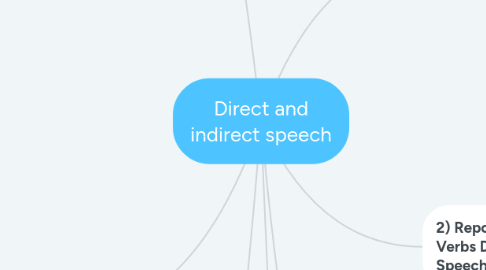
1. 4) Punctuation
1.1. DIrect speech
1.1.1. The words of the original speaker are enclosed in inverted commas
1.1.2. Ex: “I really need to get back to work,” Maria said.
1.1.3. We may also want to use a colon instead of a comma, especially in quotations
1.1.4. Ex: Plato said: “Be kind, for everyone you meet is fighting a harder battle”.
1.2. Indirect speech
1.2.1. Indirect reports of question have no question marks (?)
1.2.2. Ex: They asked her why she was still in the restaurant.
1.2.3. it is more common for the reporting clause to come first
1.2.4. Ex: She told me they had left her without any money.
1.2.5. When the reporting clause comes after the reported clause, we use a comma to separate the two parts
1.2.6. Ex: Nobody was on the street, he informed us.
2. 5) Time and place
2.1. Deictic expressions
2.1.1. Time (today, ago)
2.1.2. Place (here, this school)
2.1.3. Persons (I, they)
2.1.4. When we change from direct to indirect reports, we will find changes in these time expressions
2.1.4.1. Direct speech
2.1.4.1.1. Report speech
2.1.4.2. Now
2.1.4.2.1. Then
2.1.4.3. Today
2.1.4.3.1. That day
2.1.4.4. Tonight
2.1.4.4.1. That night
2.1.4.5. Yesterday
2.1.4.5.1. The day before
2.1.4.6. Tomorrow
2.1.4.6.1. The following day/the next day
2.1.4.7. Next day/week/month/year
2.1.4.7.1. The following day/week/month/year
2.2. Tense backshift
2.2.1. When we change a sentence from direct to indirect speech, there is usually a change of tense in the indirect sentence
2.2.1.1. “ I want to go to Australia,” Andrew said. Andrew said that he wanted to go to Australia.
2.2.2. when we report a universal general truth, there is also no tense change
2.2.2.1. Mark Said, “Sun is hot” Mark Said that sun is hot
2.2.3. Tense change
2.2.3.1. Present simple
2.2.3.1.1. Past simple
2.2.3.2. Present continuos
2.2.3.2.1. Past Continuos
2.2.3.3. Past simple
2.2.3.3.1. Past perfect
2.2.3.4. Present Perfect
2.2.3.4.1. Past Perfect
2.2.3.5. Past Perfect
2.2.3.5.1. Past Perfect
2.2.3.6. Am going to
2.2.3.6.1. Was going to
2.3. Backshift and modal verbs
2.3.1. Direct speech
2.3.1.1. Indirect speech
2.3.2. Will/shall
2.3.2.1. Would/should
2.3.2.1.1. “I will be there for you."
2.3.3. Can
2.3.3.1. Could
2.3.3.1.1. “I can see the moon.”
2.3.4. May (possible)
2.3.4.1. Might
2.3.4.1.1. “I may win the race.”
2.3.5. Might (hypothetical)
2.3.5.1. Might
2.3.5.1.1. “I might win the race.”
2.3.6. Must
2.3.6.1. Had to/must
2.3.6.1.1. “I must get my hair cut.”
2.4. Backshift and personal pronoms
2.4.1. Direct speech
2.4.1.1. Indirect speech
2.4.2. I/me/my
2.4.2.1. He/she
2.4.2.2. Him/his
2.4.2.3. Her/her
2.4.3. We/us/ours
2.4.3.1. They/them/their
2.4.4. John said: "I am coming"
2.4.4.1. John said that he was coming
3. 6) What we report
3.1. Report of statements
3.1.1. it is usual to omit that in the reported clause, especially in informal occasions
3.1.1.1. Ex: She said (that) she was leaving the following morning.
3.2. Reports of polar and alternative questions
3.2.1. yes-no question or an alternative question
3.2.2. we can use if or whether
3.2.3. “Are you going to throw a special party for the occasion”, she said. She asked if/whether I was going to throw a special party for the occasion.
3.3. Reports of –WH QUESTIONS
3.3.1. the word order is normally declarative rather than interrogative
3.3.1.1. “How was the flight?,” she asked. She asked me how the flight had been.
4. 1) Refer to the way we suport what someone sad in the past, wich may have been said in the past, in the present or in the future.
4.1. Direct speech
4.1.1. recounts the actual words used by a person
4.1.2. Ex: She said , « I’ll go to the cinema tomorrow »
4.1.3. REPORTING: She said
4.1.4. REPORTED: « I’ll go to the cinema tomorrow »
4.2. Indirect speech
4.2.1. is a recreation of the person's words wich are therefore subject to certain changes
4.2.2. Ex: She told me that she couldn’t come to your party
4.2.3. STATEMENT: “I can’t come to your party”
4.2.4. REPORTED STATEMENT: She told me that she couldn’t come to your party
5. 2) Reporting Verbs Direct Speech
5.1. SAY
5.1.1. Is more common, especially in spoken language
5.1.2. We don’t always mention the person being spoken
5.1.3. if we do mention them, we use a prepositional phrase with to
5.1.4. Ex: “Try to stay positive,” she said to us in a low voice.
5.2. TELL
5.2.1. we always mention the person being spoken to
5.2.2. we use an indirect object
5.2.3. Ex: “Take care,” she told us
6. 3) Reporting verbs Indirect Speech
6.1. SAID
6.1.1. We don’t use an indirect object with say
6.1.2. Ex: She said she was flying to NYC.
6.2. TOLD
6.2.1. we always use an indirect object with tell
6.2.2. Ex: He told me he was moving to NYC
6.3. OTHER VERBS
6.3.1. ASK
6.3.1.1. its past form asked is also most exclusively in indirect speech, rather than in direct speech
6.3.1.2. Ex: My sister asked me if I could help her.
7. 7) Reporting verbs with other structures
7.1. agree, decide, offer, promise, refuse, threaten
7.1.1. verb + infinitive
7.1.1.1. Ex: She refused to do it.
7.2. deny, recommend, suggest
7.2.1. verb + gerund
7.2.1.1. Ex: Jules recommended taking the subway.
7.3. advise, encourage, invite, remind, warn
7.3.1. verb + object + infinitive
7.3.1.1. Ex: I advise you to review for the exam
7.4. the verbs promise, agree, deny and admit
7.4.1. also use the regular form for the reported speech (that + clause) .
7.4.1.1. Ex: He promised that he would go for it!
